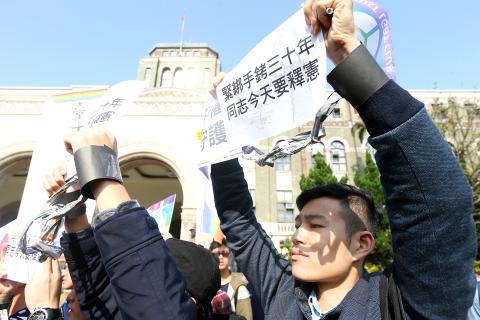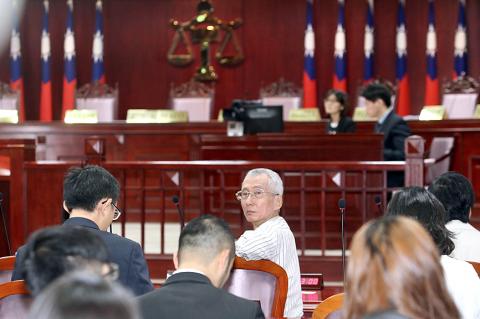The Council of Grand Justices yesterday began a session to hear a constitutional challenge concerning same-sex marriage, during which the spotlight fell mostly on Minister of Justice Chiu Tai-san (邱太三), who defended the legality of the Civil Code’s definition of marriage as being between a man and a woman.
In an unprecedented move, the debate was live-streamed. A ruling is expected within two months.
Taiwan is the first Asian nation to assent to a constitutional interpretation on the legalization of same-sex marriage.

Photo: CNA
The debate addressed two requests for an interpretation, filed by the Taipei City Government and gay rights advocate Chi Chia-wei (祁家威), who has over the past three decades sought legal recognition of his union with his partner.
The challenges mostly focus on marriage as defined in Chapter II of the Civil Code, which in Article 972, Section 1, stipulates that: “An agreement to marry shall be made by the male and the female parties in their own concord.”
Chi was the first to make his argument, followed by law professor Liao Yuan-hao (廖元豪), who represented the Taipei City Government, with both arguing that same-sex marriage is a right protected by the Constitution and that the Civil Code is unconstitutional because it does not protect homosexual unions.

Photo: CNA
The panel of 14 grand justices then heard opinions and reports from Chiu, followed by representatives of related government agencies, including the Ministry of the Interior’s Household Registration Department Director Wanda Chang (張琬宜).
After arguments were presented, a cross-examination session was held in which both sides were questioned by six court-appointed expert witnesses before the hearing ended at noon.
While a number of opinions were voiced during the hearing, Chiu’s remarks drew the most attention, particularly his insistence that a lawful marriage — based on its definition in the Civil Code and prior legal interpretations by the Ministry of Justice and the Council of Grand Justices — is limited to a union between a man and a woman.
“The Civil Code stipulates that marriage shall be between a man and a woman, and as such it is not unconstitutional. The Constitution guarantees citizens’ right to marry as that between a man and a woman, while marriage between people of the same sex is not covered under the Constitution,” Chiu said.
“For thousands of years in the nation’s history, society has instituted traditions and codes of conduct regarding marriage. Has there ever been a cultural institution or social phenomenon for same-sex marriage?” Chiu said.
“Without a doubt, there has been none,” Chiu said.
He then quoted one section of the Chinese classic I Ching (易經), also known as the Book of Changes, which reads: “With the existence of the earth and the sky, there came all living things. With the existence of the earth and the sky, there came men and women,” which he said illustrates that Chinese marriage traditions have — since ancient times — been based on a union between a man and a woman.
Chiu also suggested that same-sex marriage could destroy a number of traditional cultural and ritual observances, citing as an example the use of kao (考) and bi (妣) at funerals and memorial tablets for deceased fathers and mothers.

Tropical Storm Gaemi strengthened into a typhoon at 2pm yesterday, and could make landfall in Yilan County tomorrow, the Central Weather Administration (CWA) said yesterday. The agency was scheduled to issue a sea warning at 11:30pm yesterday, and could issue a land warning later today. Gaemi was moving north-northwest at 4kph, carrying maximum sustained winds near its center of up to 118.8kph and gusts of 154.8kph. The circumference is forecast to reach eastern Taiwan tomorrow morning, with the center making landfall in Yilan County later that night before departing from the north coast, CWA weather forecaster Kuan Shin-ping (官欣平) said yesterday. Uncertainty remains and

SEA WARNING LIKELY: The storm, named Gaemi, could become a moderate typhoon on Wednesday or Thursday, with the Taipei City Government preparing for flooding A tropical depression east of the Philippines developed into a tropical storm named Gaemi at 2pm yesterday, and was moving toward eastern Taiwan, the Central Weather Administration (CWA) said. Gaemi could begin to affect Taiwan proper on Tuesday, lasting until Friday, and could develop into a moderate typhoon on Wednesday or Thursday, it said. A sea warning for Gaemi could be issued as early as Tuesday morning, it added. Gaemi, the third tropical storm in the Pacific Ocean this typhoon season, is projected to begin moving northwest today, and be closest to Taiwan on Wednesday or Thursday, the agency said. Today, there would likely

DISRUPTIONS: The high-speed rail is to operate as normal, while several airlines either canceled flights or announced early departures or late arrivals Schools and offices in 15 cities and counties are to be closed today due to Typhoon Gaemi, local governments announced last night. The 15 are: Taipei, New Taipei City, Taoyuan, Tainan, Keelung, Hsinchu and Kaohsiung, as well as Yilan, Hualien, Hsinchu, Miaoli, Chiayi, Pingtung, Penghu and Lienchiang counties. People should brace for torrential rainfall brought by the storm, with its center forecast to make landfall on the east coast between tonight and tomorrow morning, the Central Weather Administration (CWA) said. The agency issued a sea warning for the typhoon at 11:30pm on Monday, followed by a land warning at 11:30am yesterday. As of

CASUALTY: A 70-year-old woman was killed by a falling tree in Kaohsiung as the premier warned all government agencies to remain on high alert for the next 24 hours Schools and offices nationwide are to be closed for a second day today as Typhoon Gaemi crosses over the nation, bringing torrential rain and whipping winds. Gaemi was forecast to make landfall late last night. From Tuesday night, its outer band brought substantial rainfall and strong winds to the nation. As of 6:15pm last night, the typhoon’s center was 20km southeast of Hualien County, Central Weather Administration (CWA) data showed. It was moving at 19kph and had a radius of 250km. As of 3pm yesterday, one woman had died, while 58 people were injured, the Central Emergency Operation Center said. The 70-year-old